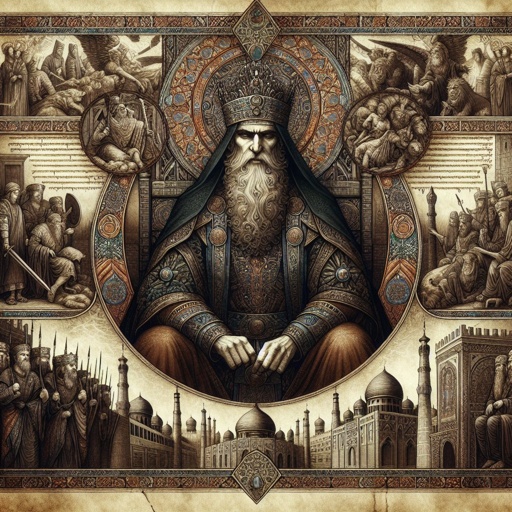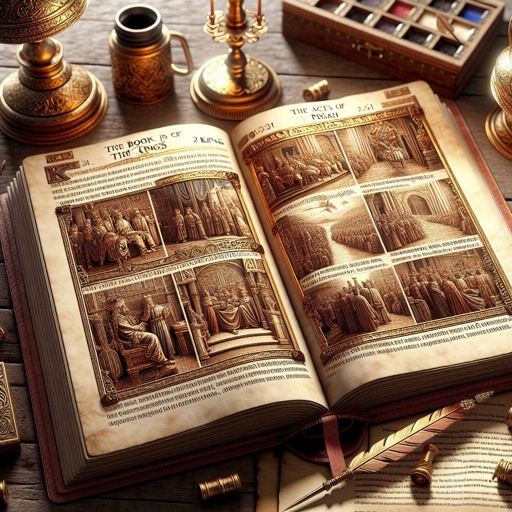What does 2 Chronicles 12:15 mean?
"Now the acts of Rehoboam, first and last, are they not written in the book of Shemaiah the prophet, and of Iddo the seer concerning genealogies? And there were wars between Rehoboam and Jeroboam continually." - 2 Chronicles 12:15

2 Chronicles 12:15 - "Now the acts of Rehoboam, first and last, are they not written in the book of Shemaiah the prophet, and of Iddo the seer concerning genealogies? And there were wars between Rehoboam and Jeroboam continually."
The verse 2 Chronicles 12:15 in the King James Version of the Bible reads: "Now the acts of Rehoboam, first and last, are they not written in the book of Shemaiah the prophet, and of Iddo the seer concerning genealogies? And there were wars between Rehoboam and Jeroboam continually."
This verse is part of the historical account of the reign of King Rehoboam, the son of King Solomon, and the division of the kingdom of Israel into two separate entities: the southern kingdom of Judah, ruled by Rehoboam, and the northern kingdom of Israel, ruled by Jeroboam. 2 Chronicles 12:15 can be seen as concluding the specific account of Rehoboam's reign and summarizing the conflict and discord that characterized the relationship between the two kingdoms.
The verse serves several important purposes within the broader context of the biblical narrative. Firstly, it functions as a historical record, ensuring that the actions and deeds of King Rehoboam are preserved for future generations. This reflects the importance of recording and remembering the history of God's people as a means of understanding His divine plan and the consequences of human actions.
The mention of the book of Shemaiah the prophet and Iddo the seer emphasizes the role of prophets and seers in the Old Testament as the mouthpieces of God, responsible for conveying His messages and preserving the spiritual and historical truths of Israel. Their writings provided authoritative accounts of the actions and reigns of the kings, ensuring that their conduct was held accountable to the divine standard.
Moreover, the verse highlights the genealogical aspect of the historical account, connecting the actions of Rehoboam to his lineage and ancestry. This underscores the importance of lineage and heritage within the biblical narrative, as well as the idea of continuity and legacy in the context of kingship and leadership.
The reference to the ongoing wars between Rehoboam and Jeroboam also holds significant symbolic and thematic meaning. It represents the ongoing conflict and division that plagued the nation of Israel, ultimately leading to the downfall and exile of both kingdoms. This strife serves as a cautionary tale about the destructive consequences of internal division and disobedience to God's commands.
Thematically, 2 Chronicles 12:15 underscores the recurrent biblical motif of the consequences of human disobedience and the constant struggle between righteousness and sin. The ongoing wars between the two kingdoms can be interpreted as a manifestation of the spiritual and moral battles that afflict humanity, highlighting the need for repentance, reconciliation, and unity under God's sovereignty.
In a broader theological context, the verse also echoes the theme of the sovereignty of God and His ultimate control over the destinies of nations and individuals. Despite the ongoing conflicts and divisions, the overarching narrative of the Bible affirms God's overarching plan for redemption and restoration.
Overall, 2 Chronicles 12:15 provides a historical, symbolic, and thematic account of the reign of King Rehoboam and the ongoing conflicts between the kingdoms of Judah and Israel. It serves as a reminder of the importance of historical record-keeping, the role of prophets and seers, the consequences of human disobedience, and the sovereignty of God. As such, it continues to hold relevance for contemporary believers seeking to understand the complexities of human history and the enduring truths of the biblical narrative.
2 Chronicles 12:15 Artwork

2 Chronicles 12:15 - "Now the acts of Rehoboam, first and last, are they not written in the book of Shemaiah the prophet, and of Iddo the seer concerning genealogies? And there were wars between Rehoboam and Jeroboam continually."

2 Chronicles 15:12 - "And they entered into a covenant to seek the LORD God of their fathers with all their heart and with all their soul;"

1 Chronicles 2:15 - "Ozem the sixth, David the seventh:"

2 Chronicles 4:15 - "One sea, and twelve oxen under it."

2 Kings 15:15 - "And the rest of the acts of Shallum, and his conspiracy which he made, behold, they are written in the book of the chronicles of the kings of Israel."

1 Chronicles 2:12 - "And Boaz begat Obed, and Obed begat Jesse,"

2 Chronicles 15:1 - "And the Spirit of God came upon Azariah the son of Oded:"

2 Chronicles 15:19 - "And there was no more war unto the five and thirtieth year of the reign of Asa."

2 Chronicles 15:14 - "And they sware unto the LORD with a loud voice, and with shouting, and with trumpets, and with cornets."

2 Chronicles 17:15 - "And next to him was Jehohanan the captain, and with him two hundred and fourscore thousand."

2 Chronicles 12:4 - "And he took the fenced cities which pertained to Judah, and came to Jerusalem."

2 Chronicles 12:14 - "And he did evil, because he prepared not his heart to seek the LORD."

2 Chronicles 12:6 - "Whereupon the princes of Israel and the king humbled themselves; and they said, The LORD is righteous."

2 Kings 15:11 - "And the rest of the acts of Zachariah, behold, they are written in the book of the chronicles of the kings of Israel."

2 Chronicles 17:12 - "¶ And Jehoshaphat waxed great exceedingly; and he built in Judah castles, and cities of store."

2 Chronicles 15:10 - "So they gathered themselves together at Jerusalem in the third month, in the fifteenth year of the reign of Asa."

2 Kings 15:6 - "And the rest of the acts of Azariah, and all that he did, are they not written in the book of the chronicles of the kings of Judah?"

2 Chronicles 14:12 - "So the LORD smote the Ethiopians before Asa, and before Judah; and the Ethiopians fled."

2 Chronicles 11:15 - "And he ordained him priests for the high places, and for the devils, and for the calves which he had made."

2 Chronicles 7:15 - "Now mine eyes shall be open, and mine ears attent unto the prayer that is made in this place."

2 Kings 15:31 - "And the rest of the acts of Pekah, and all that he did, behold, they are written in the book of the chronicles of the kings of Israel."

2 Chronicles 12:8 - "Nevertheless they shall be his servants; that they may know my service, and the service of the kingdoms of the countries."

1 Chronicles 12:12 - "Johanan the eighth, Elzabad the ninth,"

2 Kings 15:21 - "¶ And the rest of the acts of Menahem, and all that he did, are they not written in the book of the chronicles of the kings of Israel?"

2 Chronicles 14:15 - "They smote also the tents of cattle, and carried away sheep and camels in abundance, and returned to Jerusalem."

2 Chronicles 15:7 - "Be ye strong therefore, and let not your hands be weak: for your work shall be rewarded."

2 Chronicles 15:6 - "And nation was destroyed of nation, and city of city: for God did vex them with all adversity."

2 Chronicles 12:12 - "And when he humbled himself, the wrath of the LORD turned from him, that he would not destroy him altogether: and also in Judah things went well."

2 Chronicles 2:15 - "Now therefore the wheat, and the barley, the oil, and the wine, which my lord hath spoken of, let him send unto his servants:"

2 Kings 12:15 - "Moreover they reckoned not with the men, into whose hand they delivered the money to be bestowed on workmen: for they dealt faithfully."